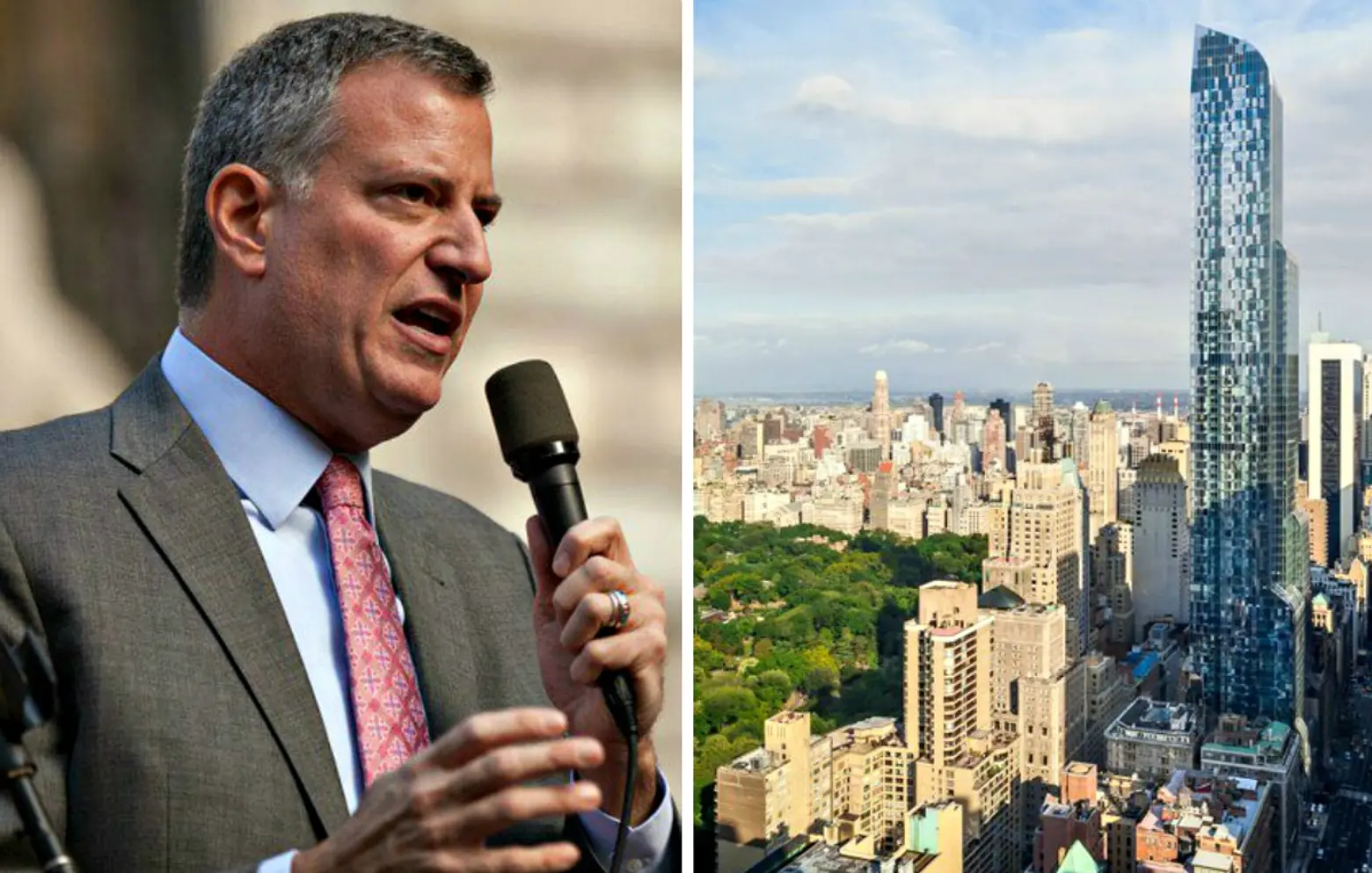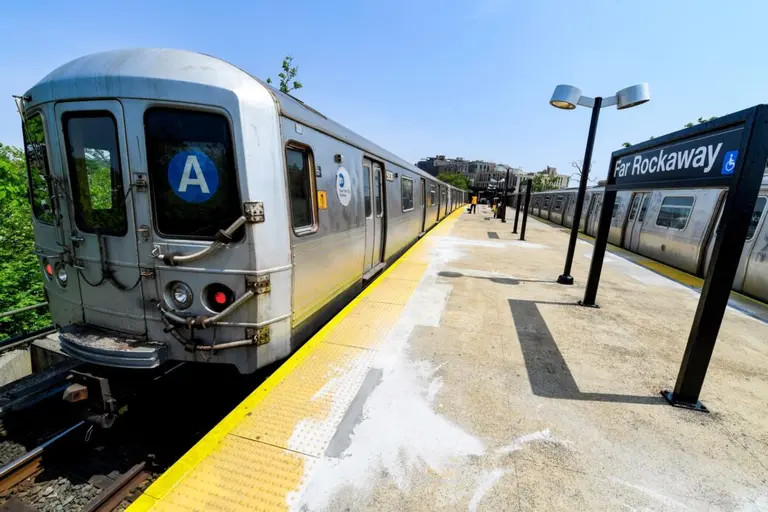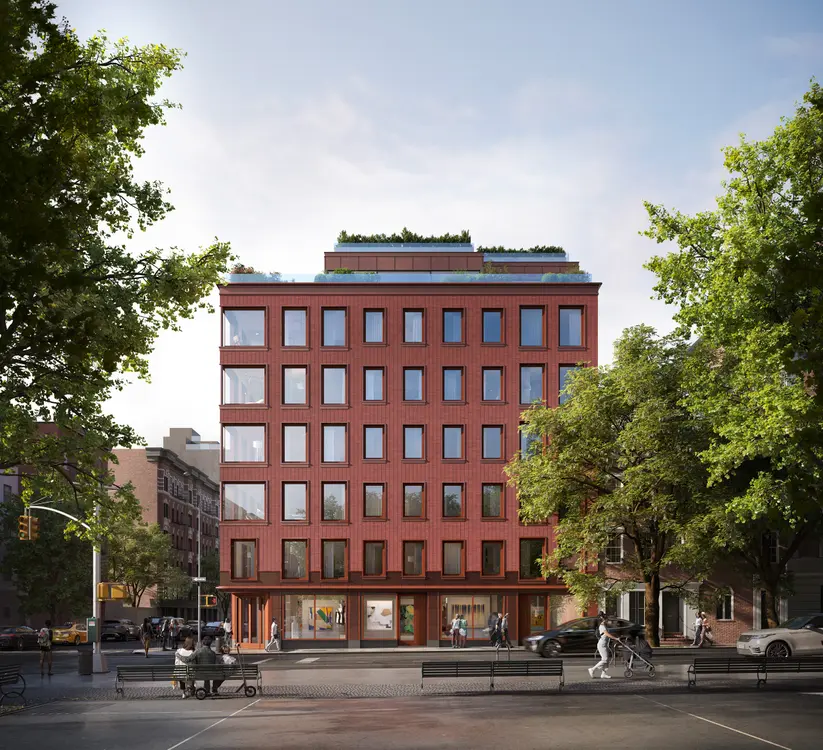To Increase Affordability, Mayor de Blasio Wants to End 421-a for Condos and Up the Mansion Tax

Mayor de Blasio via @KevinCase via photopin cc; One57 © Wade Zimmerman courtesy of Agence Christian de Portzamparc (ACDP)
From the onset, Mayor de Blasio has been extremely vocal about his plan to add 200,000 units of affordable housing over 10 years, 80,000 of which will be new construction. Though many feel this is an arbitrary number, backed up by no data as to where the units will be, the Mayor seems committed to reforming current policies to reach his goal. And after months of speculation, he has revealed his planned changes to the city’s 421-a tax incentive program, which is set to expire in June.
According to the Times, under his proposal, the controversial tax would no longer apply to condo projects (to understand the logic behind this decision just look at the $100 million sale at One57 that received the tax abatement). But it would apply to new rental projects, which would have to have apartments for poor and working-class residents make up 20 to 30 percent of the building in order to qualify for city tax breaks. It would also extend the abatement from 25 years to 35 years. Another part of the overhaul is to eliminate so-called poor doors.
De Blasio also wants to up the city’s mansion tax. Currently, home sales over $1 million are subject to a 1 percent tax, but de Blasio proposes adding an additional 1 percent tax for sales over $1.75 million, as well as a third 1.5 percent tax for sales over $5 million. He estimates this will bring in an extra $200 million a year in tax revenue, money that would be allocated to affordable housing programs.

As it stands now, 421-a offers construction and tax bonuses to developers when they reserve at least 20 percent of a building’s units for poor and moderate-income tenants. But as we reported back in February, there is a loophole. “Some development sites receive 421-a benefits as of right (meaning solely for putting up a new building), while others are required to include affordable housing.” The discrepancy comes from location. Projects in Manhattan between 14th and 96th Streets, along with those on the waterfronts of Brooklyn and Queens, must include affordable housing; all others do not have the requirement. In a statement, de Blasio said, “No more tax breaks without building affordable housing in return. This can’t be a city of just penthouses and luxury condos. We are turning the page, and making sure the same pressures that have pushed New Yorkers out of their neighborhoods are harnessed to build the next generation of affordable housing.”
Interestingly, the Real Estate Board of New York supports the plan, even though just last month they released a report saying that 5,484 affordable housing units could be lost if the 421-a abatement wasn’t renewed. Steven Spinola, president of REBNY, said, “We’re going to support it, including the mansion tax. We’re not happy about everything, but we think it will lead to building more affordable housing.”
Along with the expiration of 421-a on June 15, comes that of the rent stabilization law, which de Blasio seeks to strengthen in order to preserve affordable housing. According to the Times, “Mr. de Blasio has also called for the elimination of a provision of the rent-stabilization law that allows landlords to charge market rates once a rent-regulated unit reaches a monthly threshold of $2,500. It accounts for nearly two-thirds of the stabilized apartments lost each year. He also wants to do away with another rule that allows landlords to raise the rent by 20 percent after an apartment becomes vacant.”
The entire proposal–for 421-a reform, an increased mansion tax, and stricter rent stabilization laws–will have to approved by the State Legislature.
[Via NYT]
RELATED:
- 5,484 Affordable Housing Units Could Be Lost if 421-a Abatement Isn’t Renewed, Says New Report
- Where Will Mayor de Blasio Land on the 421-a Tax Abatement Debate?
- Developers Rush to Break Ground and Add Affordable Housing Before Tax Incentives End
- City Wants to Up Mansion Tax to Raise Funds for Affordable Housing
- City Exceeds 2014 Affordable Housing Goals, but Few Apartments Are Below 96th Street


























